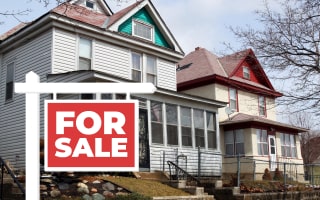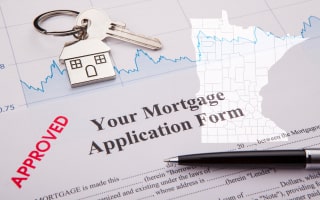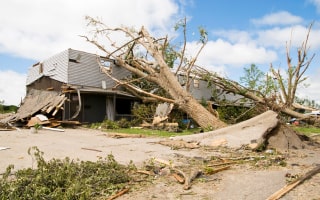Home Buying in Minnesota

The average home selling price in urban areas of Minnesota is $325,000, nearly $100,000 less than the country's average price of $420,000. Home prices have increased over 8 percent per year, which some blame on the supply of available homes being far short of the demand. Several factors contribute to the short inventory situation, including too few new homes under construction and longtime homeowners with low-interest mortgages who don't want to sell their homes because their next mortgage would have a much higher interest rate.
Buying a Home in Minnesota
A national magazine ranked Minnesota fourth of the 50 states for quality of life after examining crime, healthcare, and the economy. The state's cost of living is low, and job opportunities are good. The average income in Minnesota is $43,000 for an individual but closer to $84,000 for couples. Unfortunately, those figures are much lower for people of color, and income inequality is particularly stark in Minnesota.
Homes in Minnesota average 40 years old, and the state is mostly single-family buildings – 73 percent. There are currently twice as many single-family homes than multi-family buildings under construction in the Twin Cities. The state needs at least 100,000 additional housing units to ease the crunch, provide opportunities for first-time buyers, support local employers, and stabilize prices. Much of the country is in a similar housing crunch because we have not caught up to the multi-year slump in construction that followed the Great Recession in 2008-2010.
Catching up on home construction reduces pressure on sales, resulting in fewer above-asking-price offers and lower stress on buyers. In other parts of the country, people are paying wildly high prices for average homes. Those who can't purchase homes may end up renting from an investor-owned company, which controls about 50 percent of single-family homes for rent in the Twin Cities.
It takes about 80 days for a home in Minnesota to sell and for new owners to take possession. That average accounts for typically longer periods on the market in winter. Buyers who are prequalified for a mortgage and have a 10- to 20-percent down payment ready are likely to get the property they desire. To qualify for a mortgage, you need a good work history and a credit score above 600 (lower if you have a 20 percent down payment.) Your credit score is based in almost equal parts on your payment history and your income-to-debt ratio.
Finding the Right Home

People move to Minnesota to work at the headquarters of companies like 3M, Target, or a major medical insurer. More than 50 percent of the state's residents have college degrees. These job opportunities and the ease of travel within the state make finding a place to live within the average 24-minute commute a task.
Duluth is a lakefront city that's compared to San Francisco for the large hill that many homes are built upon. Bloomington is home to the Mall of America complex.
Property taxes in Minnesota are slightly above the national average. In Hennepin County, which includes Minneapolis, the average property tax bill is $2,831, based on an effective rate of 1.83 percent (the national average rate is about 1 percent). In Brown County, the average property tax bill is $1,588, based on a rate of 1.1 percent.
Nine Minnesota counties impose an additional 0.5 percent sales tax on top of the state's 6.8 percent rate.
If buyers choose a rural home in Minnesota, considerations include:
-
Travel time to work and necessities
-
Management of a large parcel of land
-
Distance to emergency services
Buyers who choose Minnesota cities may consider:
-
Additional local taxes
-
Neighborhood vibe
-
Crime
What is the Typical Home Buying Process in Minnesota
Whether you're moving to Minnesota for school or a job, it's important to take the temperature of an area before committing to a home purchase. Does the distance to your job or classes make sense? Does the area support your lifestyle, whether that's outdoor activities like hunting or paddling or coffeehouse music and fine dining?
Homes in Minnesota appreciate in value at about 5 percent per year, about the same as the rest of the country. Yet, if the housing market slows, will you get your money back when you're ready to move on? Such considerations can affect your purchasing decisions. Considering the average $2,200 townhouse rental in comparison to a $350,000 home with a 20 percent down payment, the rental option is more cost-effective in the first four years, but if you plan to stay a long time, buying a home in St. Paul at $350,000 is the better option.
Partnering with a local realtor should enhance your chances of finding a home with the qualities you want. A buyer's agent listens to your priorities and your budget, and sifts through listings to find those within your desired location and amenities. That person will also help you create a strategy for purchasing a home, including writing your offer and negotiating the price.
If you're shopping in Minneapolis or another city that requires the home seller to submit to a Truth in Sale of Housing (TISH) report, which is a basic inspection of the structure and systems, be sure to get a copy for each home in which you are interested.
When viewing available homes, your realtor should have research ready on each property's price history, the pros and cons of the local area, and insight on taxes. They will help hire an inspector, renegotiate the price if there are significant issues, and keep the closing process on track.
A buyer's agent requires a contract outlining their role and payment. Rather than splitting a 5-6 percent commission with the seller's agent, buyer's agents now negotiate payment with the buyer. Their payment can be written into the purchase offer, making the commission part of the sale price.
In general, the process of buying a home is:
-
Gathering funds for a down payment.
-
Prequalifying for a mortgage.
-
Identifying the optimal area and price, and ranking alternatives.
-
Visiting homes on the market.
-
Making an offer and down payment.
-
Inspecting the property for defects.
-
Having the deed researched.
-
Closing on the sale, including paying closing costs.
Financing Your Home Purchase

A bigger down payment makes it easier to get a mortgage, but even a significant amount of cash isn't enough for most banks. You may consider borrowing from a family member as an option. A single buyer making $50,000 annually with 20 percent down on a $300,000 home is unlikely to be approved for a 30-year mortgage because payments would be about $1,700 per month. Lenders won't allow most buyers to take on a mortgage that's more than one-third of their annual income. Closing costs are usually 2 percent to 5 percent, or an additional $6,000-$12,000, which is also expected in cash.
Start with your local bank when shopping for the best mortgage rates. If the bank has a history of working with you, it may extend special benefits to get your mortgage business. It's important to compare your bank's offerings to those of a mortgage broker who has access to a wide variety of mortgage options. Your decision may hinge on your knowledge of and comfort level with the mortgage industry.
To get the best mortgage terms, your income-to-debt ratio and your history of on-time payments are critical. Your credit should be above 600 for government-backed loans and above 640 for other mortgages. A high credit score can lower your down payment requirement and get a better interest rate. Start early by requesting free copies of your credit report from the major agencies (Experian, Equifax, and TransUnion) and checking them for errors.
The federal interest rate is above 7 percent, which translates to higher payments for buyers.
Fixed-rate mortgages are good if interest rates are low, but less desirable if rates are high (rates rise and fall incrementally over periods of years). Adjustable-rate mortgages are riskier because the interest rate can change during the loan's term. Jumbo mortgages allow wealthy buyers to borrow more than the federal housing authority limit, about $766,000, in areas of particularly high property values.
Mortgage options include these government programs:
- Minnesota Housing offers special mortgage programs for income-limited first-time buyers or those who haven't owned a home in three years. These require owner occupancy with lower down payments for qualified buyers.
- FHA mortgages are tailored for first-time buyers with down payments of less than 5 percent.
- Rural properties may qualify for USDA loans, especially buyers with low incomes, but good credit scores.
- Military veterans and their surviving spouses may seek a Veterans Administration-underwritten VA loan. These mortgages do not require PMI and may be used multiple times by qualifying individuals.
Home Insurance

Minnesota does not require homeowners insurance, but mortgage lenders usually make it mandatory. The national average cost of homeowner's insurance is $2,300 per year, which is about what Minnesotans pay. The state has a low incidence of severe weather, flooding, and other issues that would push the cost up. A mortgage lender will require both homeowner's insurance and mortgage insurance, called PMI, to protect their interest in the property. PMI is calculated according to the mortgage borrower's credit score, usually $1,300 to $4,500 per year on a $300,000 mortgage. This is in addition to your mortgage payment.
Regardless of any obvious extreme weather threats, it's a good policy to consider additional insurance for barns, fences, and garages, which are not covered unless specifically noted in the policy. Valuable personal possessions inside the home are also unlikely to be covered by insurance unless an additional rider is written.
Home Buying Challenges
There's no denying that a home purchase is both personal and financial. Owning your home makes you more secure against rent increases and unplanned moves, but it can be a challenge to sell if your job or other prospects make you transfer. Since properties are appreciating at a modest pace a home purchase should be a long-term commitment to realize a profit on your investment. Remember, if you move and decide to rent your property, your mortgage is affected because it will no longer be your primary domicile.
Keeping a property in good condition, including addressing any structural or systemic issues, protects your investment.
Minnesota Home Inspections
A Minnesota home inspection is crucial because harsh winters can severely damage houses and property. Some of the common issues within the state are foundation problems, water damage, and mold. A home inspection in Minnesota can help inform buyers of these hidden issues and avoid costly repairs after the sale. If the inspector finds anything concerning, the buyer may have some negotiating power.
A home inspection in Minnesota is a physical inspection that evaluates the condition and functionality of the structural elements, major systems, safety items, and appliances. The inspection will examine the following:
-
Structural Elements: The inspector will review the foundation, walls, floors, ceiling, and stairs for signs of decay or damage.
-
Roof: Inspectors check the condition of the shingles, flashing, gutters, and chimney, examining them for leaks or other signs of wear and tear.
-
Home Exterior: They will also check the home's exterior (siding, windows, doors, etc.), looking for leaks or signs of damage.
-
Heating, Ventilation, and Air Conditioning (HVAC): Inspectors will test the heat, air conditioning, and ventilation systems to ensure they operate correctly and comply with safety codes.
-
Plumbing: The inspection also includes checking pipes, fixtures (tubs, sinks, toilets), and the water heater, as well as looking for any leaks, damage, or other issues.
-
Electrical: Inspectors will also examine wires, outlets, electrical panels, circuit breakers, and light fixtures for safety and compliance.
-
Attic: Attics, too, can have issues that could be costly to fix, like insulation, ventilation, water damage, and rodents.
-
Interior: They will also examine the house's interior (walls, ceilings, floors, windows, etc.), looking for signs of damage or structural issues.
-
Additional Services: Some include tests for mold, radon, termites, asbestos, lead paint, and other contaminants.
A Minnesota home inspection costs between $300 and $500, depending on the home's size, location, age, condition, and any optional tests. The average cost of a home inspection in Minneapolis, MN is $300-$500.
The Process
Although sellers sometimes perform pre-listing home inspections to avoid any surprises later, most often, the buyer pays for the inspection because it benefits them when they go into the sale. The process is as follows:
- Find a reputable, affordable home inspection firm.
- Schedule the inspection according to the contract terms as quickly as possible.
- Show up and ask questions. They usually take between 2 and 4 hours.
- Review the final report and decide what to do.
The top five home inspection companies in Minnesota are:
- Heartland Inspections, St. Paul, MN
- Marigold Home Inspections - Coon Rapids, MN
- Midwest Home Inspect - Minneapolis, MN
- Everest Home Inspectors - Minneapolis, MN
- Structure Tech Home Inspections - St. Louis Park, MN
After the Inspection
After the inspector completes their evaluation, they will take a few days to compile a complete report. The report will include details of everything, including any issues they see as a concern. Once they submit the report to the buyer, the buyer has some choices about what to do. They are as follows:
- Save money by negotiating a lower price.
- Ask the seller to make all repairs before closing.
- Ask for a home warranty.
- Back out of the sale altogether.
- Ask to put down less for the down payment.
Inspection Top Cities
| City | Inspection Cost | Local Issues | Local Rules | Local Home Types |
|---|---|---|---|---|
| Home Inspection in Minneapolis | $350-$500 depending on the house's size, age, and specific services ordered. | Moisture damage, aging systems, and structural integrity. | Not mandated but strongly recommended. Subject to "Truth-in-Sale of Housing" (TISH) requirements. | Craftsman, Ranch, Tudor, and Colonial. |
| Home Inspection in St. Paul | $235-$546, with the average being $395. | Roof, HVAC, plumbing, and electrical wiring. | Subject to “Truth-in-Sale of Housing" (TISH) requirements. | Craftsman/Bungalow, Prairie, Colonial, Tudor, and split-level. |
| Home Inspection in Duluth | $336-$600 based on the home's size and extra tests like radon. | Ice damage, foundation issues, moisture-related problems, and insect damage. | Mandated by lenders but not the city. | Single-family, condos, townhouses, and apartments. |
| Home Inspection in Brooklyn Park | $395-$546 based on the home's square footage and age. | Roofing, electrical, plumbing, wood rot, foundation issues, and HVAC. | No city rules. | Single-family, condos, townhomes. |
| Home Inspection in Maple Grove | $395-$600 based on the size and age of the property. | Roofing, electrical wiring, foundation problems, and HVAC. | Driven by the “Truth-in-Sale of Housing” (TISH) requirements. | Single-family, condos, townhomes, and land. |
Instant Access to Minnesota Property Records
- Owner(s)
- Deed Records
- Loans & Liens
- Values
- Taxes
- Building Permits
- Purchase History
- Property Details
- And More!